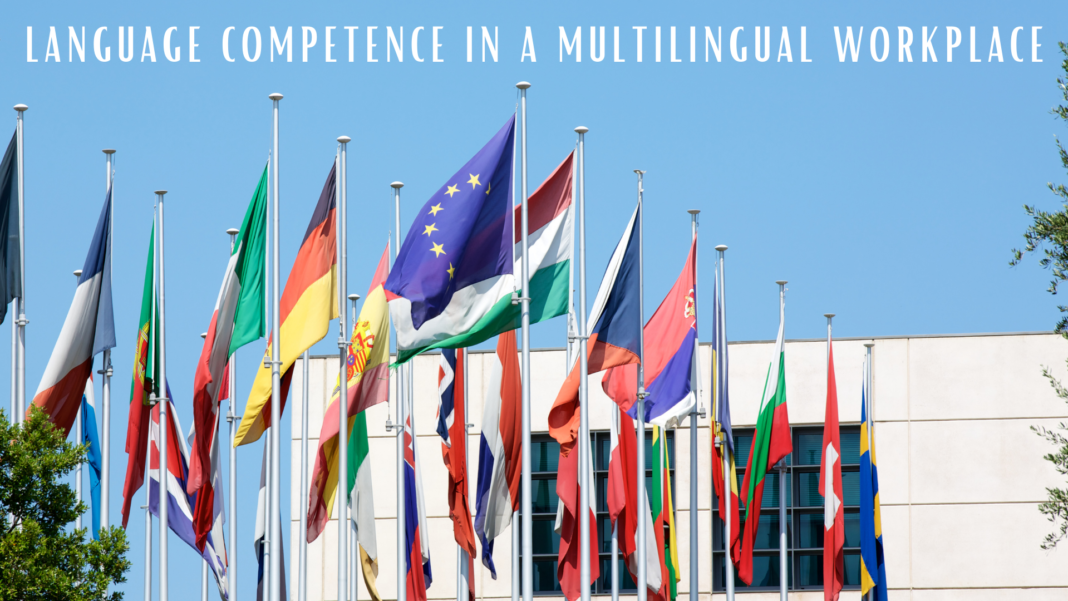How do people perceive multilingualism and language behaviours at work and how does it influence their language practices? Research shows, even language professionals may need to reconsider what multilingualism means to them.
Recent research on multilingual communication sparked discussion in an EU institution in Luxembourg about the implications of talking about the language use in the workplace. From September 2020 to May 2021, two cohorts of trainees and their seniors in a terminology and communication unit participated in a study organised by the University of Luxembourg. This article provides a brief summary of the first research report.
The European Union values multilingualism, its institutions are officially and structurally multilingual, and the equality of all languages is a key structural principle. In an ideal world, everyone working there would know each of the 24 official EU languages. In real life, however, this is hardly possible. Therefore, in the unit under research, English was chosen as the main common language for internal communication. Participants did not think it would be an issue of linguistic injustice, but they felt it was limiting their own communication.
Multilingual communication was preferred in the workplace. Seniors found personal enjoyment in multilingualism and tried to support it in the team. Despite this, the trainees felt their experience was rather monolingual. Although they communicated with other staff members (security guards and cleaning and publishing services) in French and with their supervisors in their native language, the trainees did not see these exchanges as “multilingualism at work”.
Research analysis revealed that the trainees and the seniors felt differently about maintaining a professional face in communication, which was also reflected in their practices. The seniors distinguished between how language is used for the final linguistic outputs of the unit and for their daily communication. The former was a matter of standardised professionalism achieved through cooperation in the team. Whereas the language in everyday workplace encounters did not have to be perfect at every moment; it just had to be effective, bring joy and conviviality.
The juniors initially had a different attitude towards their language use in the workplace. They feared that their competence would be judged based on linguistic mistakes that they would make. Therefore, they hardly ever used any other languages except their first language and English. They only dared to choose other languages for their communication when they were feeling particularly “brave” or were personally closer to the interlocutor(s).
The juniors’ stance gradually changed as the team discussed their motivations and the real effects of language use. After the initial fear of making too many mistakes and being judged, the trainees realised that language use in real life is about more than just linguistic accuracy. This way, some trainees discovered untapped potential and were confident enough to ask for an alternative language for their own practice. They felt that their new understanding of multilingualism gave them more flexibility. At the end of the research, the trainees overcame their fear of personal inaccuracy and found comfort in multilingualism at work.
Analysis revealed that the limiting factors did not stem from structural conditions, but from the trainees’ personal interpretation of other people’s stances and their self-language policing. When the trainees ceased to construct multilingualism as proof of professional competence and began to see it as a fundamental aspect of their own well-being, personal self-realisation, and growth, they aligned their stances with those of the seniors. The seniors also recognised that the newcomers might need explicit support to overcome their fixation on mistake-free communication.
If you are interested in details of the study, you are welcome to check the full report published in a peer-reviewed article recently published in the Journal of Multilingual and Multicultural Development.
Further readings
Iskra, Katarzyna A. 2021. “European Parliament. Fact Sheets on the European Union.” Language Policy. https://www.europarl.europa.eu/factsheets/en/sheet/142/language-policy
Lovrits, Veronika. 2021. Pigeonholed by the ‘native English’ privilege. Bilingualism Matters, May 17, 2021.https://www.bilingualism-matters.org/network/bilingualism-matters-luxembourg/news/pigeonholed-by-the-native-english-privilege
Saville-Troike, Muriel. [1982]. 2003. The Ethnography of Communication: An Introduction. 3rd ed. Oxford: Wiley-Blackwell.

Written by Bea Schlembach.
Bea is currently a master’s student in “Learning and Communication in Multilingual and Multicultural Contexts” at the University of Luxembourg.

